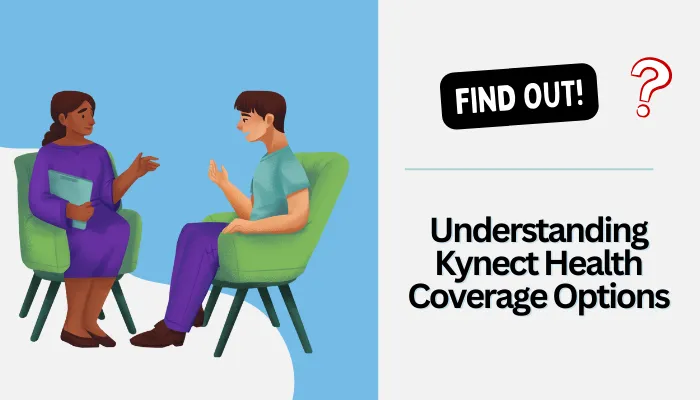The Kynect benchmark tool makes it easier to navigate the Health Insurance Marketplace. Although understanding the tax implications of health insurance is difficult, financial planning demands so.

We will simplify this process by outlining health coverage options and their tax benefits in this article. Using the Kynect benchmark tool, you can find a suitable plan for your needs that takes into account tax advantages.
This tool streamlines your journey through the Health Insurance Marketplace and helps you choose what suits best for you in terms of coverage.
What is Kynect Benchmark Tool?
In the present day, people have found value in a perfect tool called the Kynect benchmark tool which improves the experience of navigating through the Health Insurance Marketplace.
When it comes to health insurance, it can be difficult for an individual to comprehend the available choices and their ramifications as far as cost is concerned.
Consequently, with the help of the Kynect benchmark tool, users can effectively analyze various health insurance plans depending on what they are looking for.
This system further takes into account different considerations such as premiums, deductibles, copayments, and coverage benefits that are used in making sound choices compatible with our financial goals and healthcare requirements.
Another benefit of the Kynect benchmark tool is that it displays tax advantages linked to particular healthcare schemes hence improving peoples’ financial savings while ensuring adequate medical coverage.
By capitalizing on this tool, individuals can confidently maneuver through Health Insurance Marketplace complexities thus securing a plan that will ideally serve their health and financial needs.Understanding Kynect Health Coverage Options

Health insurance provided through employers: Many employers offer health insurance plans as part of their employee benefits package. The premiums for these plans are typically taken out of your salary before taxes are considered.
Additionally, some employers pay part of this premium which further reduces your tax liability.
- Marketplace plans: The ACA established marketplaces where individuals and families could purchase subsidized plans based on income levels. These credits can help in reducing the amount paid monthly for plan costs.
- Medicaid: This government program provides health coverage to low-income individuals and families. No taxes are involved when one accesses Medicaid.
- Other forms of health insurance: These may include Medicare which is only available to the seniors and disability insurance – both having their own requirements for eligibility and taxation systems attached to them.
Knowing what type of health coverage you have is important in determining how it will affect your taxes. It is important to seek advice from a tax professional regarding these matters taking into consideration your particular situation.
A-one stop shop for health insurance options – Kynect
Kynect Benchmark Tool offers a simplified approach to enrollment into healthcare schemes. Through it, you will be able to:
| Feature | Description |
|---|---|
| Compare Plans | Compare various options offered by different providers in your location with ease filtering those which suit best according to budget, needs, and desired level of cover. |
| Estimate Costs | Determine what each plan’s potential monthly premium rates would look like together with its deductibles along out-of-pocket expenses. |
| Enroll Online | It is possible to enroll directly from the platform using the Kynect Benchmark tool portal, thus making the process of enrolling much easier and quicker. |
By using Kynect benchmark tool, you can make informed decisions on your health insurance while getting maximum tax benefits.
Tax Tools for Health Coverage
Tax season may be overwhelming but tax forms related to health coverage can demystify it. These are two important forms:
Form 1095-A: This form is provided by your health insurance marketplace or employer. It shows what kind of medical insurance was obtained during the year. This information is necessary if you want to claim any eligible tax credits for medical insurance.
Form 8962: Use this form in case you paid for health insurance yourself and did not receive employer-sponsored coverage to claim a deduction for health insurance premium.Therefore, accurate use of these forms ensures that one receives all their deserved tax benefits on health insurance policy.
You should consider a few extra tips when filing your taxes:
- Keep all your health insurance documents organized: These will include your Kynect Benchmark tool enrollment records, Form 1095-A (if applicable), as well as any receipts showing payment of premiums directly.
- File electronically: One can e-file their return securely and efficiently. Majority of tax software can help import unbiased information from Form 1095-A regarding healthcare schemes into your document.
- Seek professional tax consultations: In case of any queries or complexities arising from your health insurance and how it affects taxes, it is always advisable to seek a professional tax advisor.
By understanding the options for coverage, using the Kynect Benchmark tool for decision-making purposes, and reporting correctly all the information on your health insurance on your tax forms you can better navigate through this season with increased clarity and confidence.
Master Health Insurance Taxes and Avoid Penalties

Health insurance is part of financial well-being, but its connection with taxes can be a complicated puzzle. This paper allows you to move through this maze confidently by using the Kynect benchmark tool that guides you.
We will first take a look at tax credits and subsidies; then we will analyze individual mandates including their exemptions; finally, we will provide you with a step-by-step guide on how to use Kynect Benchmark tool during the annual taxation period smoothly.
Tax Credits And Subsidies For Health Insurance Understanding
The Affordable Care Act (ACA) introduced several measures among them tax credits and subsidies so as to make healthcare more affordable. These lower your monthly premiums significantly thereby enhancing access to quality care.How do tax credits work?
- Premiums are lowered by premium tax credits contained in health insurance bill every month.
- The amount of credit received depends on such factors as income, family size, and plan cost associated with the chosen policy.
Eligibility for premium tax credits:
- To have access to premium tax credits one must sign up for a health plan via ACA established Health Insurance Marketplace
- Your household earnings should fit within certain levels based on the federal poverty line
Kynect to the Rescue!
Kynect Benchmark tool helps simplify the financial assistance eligibility determination process. Its features allow users to:
- Estimate your tax credit: Understand how much potential tax credit you might qualify for depending on what level of income you fall into as well as your choice of insurance plan.
- Compare plans with tax credits in mind: Have a look at plans together with the estimates of their tax credit values and thus make cheaper choices.
By utilizing Kynect benchmark tool, you can get the maximum benefit from your tax credits and obtain affordable medical care.
Tax Penalties And Exemptions
The individual mandate was enacted by ACA which originally imposed a fine on persons without insurance coverage. It is however important to know about this requirement and how one can be exempted even though it has been eliminated since 2019.
What is the individual mandate?
The goal of the individual mandate was to increase the number of insured people toward a healthier overall population. It penalized those who did not follow this policy.
Exemptions from the individual mandate:
There may be some reasons why an individual could avoid paying a penalty for not having coverage under an individual mandate. These are:
- Income below the tax filing threshold: If your earning falls below certain levels, you may be excused from a non-coverage fine or penalty.
- Affordability hardship: If health insurance’s premiums cost more than a specific proportion of your earnings, then you become eligible for exemption from payment.
- Religious objections: There are some religious practices that can be used to request exemption from such requirements.
Kynect: Your Partner in Avoiding Penalties
Those seeking exemption from penalty for non-compliance with individual mandates should consider Kynect’s relevance. To this end;
- Check the conditions for exemption: The Kynect Benchmark tool has information on different categories of exemptions.
- Estimate affordability: This platform will allow you to calculate whether or not the cost of health insurance would make you eligible for a hardship exemption.
If you know your options and use Kynect Benchmark tool resources, you won’t have to pay a fine because of not having medical cover.
Conquering Tax Season with Kynect as Your Co-Pilot
There is no need to be worried during the tax season. When considering health insurance-related tax implications, Kynect benchmark tool offers users all the tools and information required to navigate through this process smoothly.
A Step-by-Step Guide to Using Kynect Benchmark tool for Tax Season:
- Gather your documents: Collect your Kynect enrollment records, Form 1095-A (if applicable), and any receipts for health insurance premiums you paid directly.
- Access Kynect’s tax tools: The Kynect platform may offer resources specifically designed to help with tax preparation. Explore these tools to see if they can assist you in organizing your health insurance tax information.
- Consult Kynect’s support: If you have any questions about using Kynect for tax purposes, don’t hesitate to reach out to their support team for clarification.
Tips for a Smooth Tax Filing Experience with Kynect Benchmark tool:
- File electronically: E-filing is a secure and efficient way to submit your tax return. Many tax preparation software programs can seamlessly import your health insurance information from Form 1095-A with Kinect’s assistance (if applicable).
- Seek professional guidance: If your tax situation is complex or you have specific questions, consider consulting with a qualified tax advisor for personalized advice.
By following these steps and utilizing Kynect Benchmark tool‘s resources, you can approach tax season with a sense of control and confidence.
Simplifying Health Insurance and Taxes

Health insurance is one of the pillars of financial protection but it seems like you are going through a maze when you think of tax consequences.
This article aims to demystify the process by providing real-life scenarios, showcasing the value of the Kynect benchmark tool, and offering a clear roadmap to understanding the tax benefits associated with different health coverage options.
Real-Life Scenarios
Let’s take some everyday instances and see how health insurance choices can change our tax bill:
| Scenario 1: Sarah and the Employer-Sponsored Plan: Sarah has health insurance through her place of employment. Salary deductions are made for premiums that reduce her taxable income on a before-tax basis. Furthermore, her employer contributes part of this amount towards payment for premiums lowering her tax liability. |
| Scenario 2: Michael and the Marketplace Plan: A self-employed contractor, Michael found an ACA marketplace plan for his family. Based on his earnings, he qualifies for a Premium Tax Credit which substantially lowers his monthly premium payment. The market sends him Form 1095-A electronically which is used to enable him enjoy discounted rates as he remits taxes. |
| Scenario 3: The Patel Family and Kynect Benchmark tool: A health policy is what the Patel’s seek at this point in time. They rely on Kynect Benchmark tool to compare plans from various providers within their geographical vicinity. This helps them estimate costs and understand what they receive specific policies entail so that they make informed decisions based on their budget allocation towards healthcare services as well as other purposes. |
When it comes to filing tax returns during the next season; enrollment records made available by Kynect will be very essential documents for them in order to claim any pertinent medical expenses deduction or child credits associated with their coverage choices or any other applicable tax benefits.
Your Partner in Health Insurance and Tax Management
The importance of taking into account the tax consequences of your health insurance choice is evident in these examples. Here are some ways Kynect makes it easier:
- Simplified Plan Comparison: Forget about overwhelming research! Use the Kynect Benchmark tool to compare various health insurance plans from different providers available within your area. Find what matches you by filtering by need, budget, or coverage desire.
- Transparent Cost Estimates: What are the potential monthly premiums, deductibles, and out-of-pocket costs for each plan? Through this tool, you comfortably make informed decisions on how much money to pump into the sector of your health assurance.
- Seamless Online Enrollment: Get rid of cumbersome paperwork! With Kynect Benchmark Tool, you do not have to fill out forms because they have automated steps in place for joining a program. As an effect, people save time using this means, and that results in a smooth passage from one policy to another.
Maximize possible tax deductions while being knowledgeable about health insurance options and understanding key facts about your health insurance as tax season approaches!
Conclusion
Knowing the financial implications of healthcare is crucial when planning for tomorrow. By now you should be able to navigate through different types of health insurance such as employer-sponsored plans, marketplace policies, etc., their corresponding advantages relating to the taxation of income and other components as well as why the Kynect benchmarking tool exists.
- Consult a tax professional: For specific guidance tailored to your unique circumstances, seeking advice from a qualified tax advisor is always recommended.
- Keep organized records: Put together all your information about enrollment through the Kynect portal, 1095-A if it applies and whatever receipts show payment made directly toward premium amounts.
- Embrace e-filing: If you want to file taxes securely and quickly consider filing them electronically as there are many income tax preparation software programs that will import your Health Insurance information from form 1095-A.
By following these tips and using the Kynect benchmark tool you can be much more confident in handling health insurance with respect to taxes and thus making sure that the next tax season is easier and your financial future is secured.
